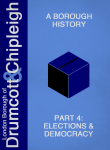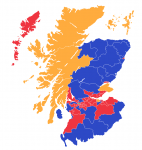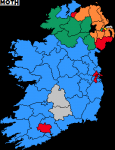Kevin Newton, I believe.Who dat Kipper in the South?
-
Hi Guest!
The costs of running this forum are covered by Sea Lion Press. If you'd like to help support the company and the forum, visit patreon.com/sealionpress
You are using an out of date browser. It may not display this or other websites correctly.
You should upgrade or use an alternative browser.
You should upgrade or use an alternative browser.
Moth's Graphics & Test Thread
- Thread starter moth
- Start date
A sneaky peak at something I'm having some fun with
View attachment 480
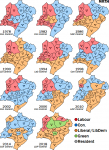
SteveBP
If-Christ-Had-Not-Died-For-Thee-Thou-Hadst-Been-Da
- Location
- Tāmaki Makaurau
- Location
- Toronto, ON, CA
He looks like he just saw a gay couple kiss.snip
I was going to use the poster myself for a vignette, but I'm happy to make you some in the same 'German' style, if you'd like.Can I use this when I revamp my Christian Democrats TL?
He made that face a lot around GVJ when he came down at the last election, IIRC.He looks like he just saw a gay couple kiss.
- Location
- NYC (né Falkirk)
- Pronouns
- he/him
Hello Glasgow Pavilion!
If you pretend the light blue Nat Libs are still with the Liberals, looks strangely 1935.What the constituency seats of the 2016 Scottish Parliamentary election looks like when we remove the SNP.
View attachment 1047
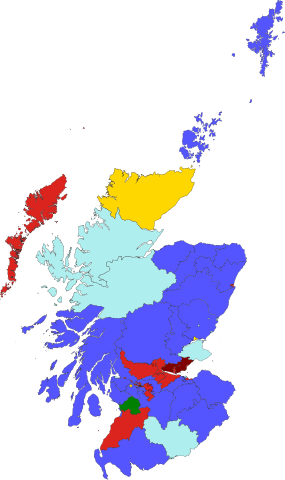
(of course I'm cheating just because there's one green seat--but that's National Labour)
Extract From: The By-Elections That Rocked the World (The Guardian)
1970 was always going to be a hard year for Labour. Twelve years since they had come into office, three since Reginald Goodwin had assumed the Premiership, and one year since their rot victory in the 1969 General Election, the effects of Britain's deepening involvement in the Indochina War, the sudden economic whiplash caused by the oil shocks of the Arabian Revolution, and strife in the wake of mass strike after failed attempts at Government reform in the Unions was a recipe for electoral disaster. From the moment Parliament had been opened, Labour watched in dread as its majority of 54 was slowly whittled away by death and resignation, and with the formation of the Conservative-Liberal Pact in the Autumn of 1969, every by-election was almost certainly a loss for the Government. The sudden resignation of Oxford University MP Dick Taverne on May 1st 1970, officially so that Taverne could assume the Vice-Chancellory of Oxford University, was the fifth of such resignations and triggered the eighth by-election of the Parliament, and could not have come at a worse time for Labour. Announced on the same day that the Treasury devalued the pound for the third time since the election 1970, and on the same day the names of ten British servicemen killed in lower Laos was released to the public, it was immediately clear Labour would lose Oxford.
Initially it looked to be a clear victory for the Liberal Candidate of the Conservative-Liberal Pact. However the selection of ecologist and fervent anti-socialist Tony Whittaker over Margret Bray, the preferred choice by both the Conservative and Liberal Leadership, in the open primary caused a great deal of hang-wringing, both private and public, over the Pact, with senior figures in both party's expressing distress at a candidate who had been swept up from the grassroots and was starkly to the left of the Liberal Party. Some, such as Liberal Leader Frank Beyers, were willing to grin and bear it, however others, such as the former Mayor of London and Oxford alumni William Rees-Mogg, took matters into their own hands. Rees-Mogg would run as an Independent 'conservative alternative' candidate. Labour chose Research Fellow David Luard- some had expected the Scottish Broadcaster David Steel to be given the seat, however Steel was adamant he would stay and fight for a seat in the Highlands, and for Labour, the uncontroversial Luard seemed an obvious choice. Luard was handed nomination, however ran an uninspiring and moderate campaign under the promise of a safe Liverpool seat at the next General Election, frustrating Labour's more left wing members and voters, who felt a more radical figure would be suitable for such pressing times.
In came the Communist Party of Great Britain and their candidate, lecturer of Politics at the University itself, Professor Edward Heath. A longtime member of the Party, having joined in his youth after bike rides with long dead friends, and a veteran of the Spanish and Italian International Brigades, the 54 year old Heath seemed from the outside looking in a strange choice for candidacy. However his popularity among the local Party membership, many of whom he taught, and in the social sphere of Oxford University itself, saw Heath chosen to fight for the Constituency. His campaign was largely focused on harnessing the swell of opposition to the Indochina War, and the disenchantment left-wing members of the University Electorate had with the Labour Party, however faced allegations that he was on the side of the Vietnamese and Cambodian Communists and the USSR- these were unfounded, but with 'Communist' next to his name on the ballot, he faced an uphill battle to convince the electorate otherwise.
The final candidate worth note was Helen Anderson, a member of the National Democratic Party, a neo-fascist outfit based in Oxford itself. Campaigning on a platform of peace in Indonesia, the entry into the European Economic Commonwealth, equality of rights for men and women, and the repatriations of black and middle eastern Britons to their homelands, Anderson's natural charisma proved to be the most effective tool in her arsenal, rallying a swell of the discontent to her cause. Her uniqueness at the time- both as a woman and a fascist- drew attention, both from British press, but also in international news. In Alberta, for example, a curiously small following surrounded Anderson during and after the by-election, a following that would later form the terrorist Albertan Democratic Front. In Japan, she became the subject of numerous art pieces by artists captured by her energy and magnetism; many of these pieces were acquired by Oxford University following her death in 1993. And in America, she would inspire a certain young women from Illinois who didn't think to check her actual platform to run for office.
Overall the campaign was bitter, with Whittaker aggressively denouncing socialism in all forms in deluded rants in Party literature, many of which Liberal Party delivers simply refused to deliver outright. By the start of June the press had begun to treat Heath and Anderson as candidates more serious than Whittaker, which did rot to their public profile. The campaign itself was marked with acts of violence; The Social Creditist Kibbo Kift movement had backed Heath and the Communists, having withdrawn their support of Whittaker, figuring Heath a better candidate for environmentalist concerns, and, acting on their own accord, engaged in street fights with black and brown shirt campaigners who had come to lend a hand to Anderson's campaign. A notable incident involved an attempted black-walling of Heath and Luard by Martin Webster and the League of Empire Loyalists at an ambush in the Oxford City Centre- both men escaped potential embarrassment when members of the Kibbo Kift and Jewish Students Union charged the Silver Shirts.
Despite violence, all candidates made it to polling day in one piece. However, the results proved a shock for all; Rees-Mogg had split the Pact's vote, Labour had simply collapsed, and Anderson was less than 600 votes from victory, a high-water mark for the National Democratic Party, but a high from which no far right party has ever matched. Through a well organised but frantic campaign, Heath and the Communist Party captured Oxford University by 12 votes in a four cornered result.
Taking to the stage, Heath waited a few minutes for the cheering and jeering to die down, even dodging a bottle thrown by a young John Griffin. But as the cheers died and the jeers fell silent, and the cameras watched with the the world in some strange tense awe, Professor Edward Heath, the first Communist elected to Westminster since 1945, coughed into his closed first and delivered his first- and his only- victory speech.

1970 was always going to be a hard year for Labour. Twelve years since they had come into office, three since Reginald Goodwin had assumed the Premiership, and one year since their rot victory in the 1969 General Election, the effects of Britain's deepening involvement in the Indochina War, the sudden economic whiplash caused by the oil shocks of the Arabian Revolution, and strife in the wake of mass strike after failed attempts at Government reform in the Unions was a recipe for electoral disaster. From the moment Parliament had been opened, Labour watched in dread as its majority of 54 was slowly whittled away by death and resignation, and with the formation of the Conservative-Liberal Pact in the Autumn of 1969, every by-election was almost certainly a loss for the Government. The sudden resignation of Oxford University MP Dick Taverne on May 1st 1970, officially so that Taverne could assume the Vice-Chancellory of Oxford University, was the fifth of such resignations and triggered the eighth by-election of the Parliament, and could not have come at a worse time for Labour. Announced on the same day that the Treasury devalued the pound for the third time since the election 1970, and on the same day the names of ten British servicemen killed in lower Laos was released to the public, it was immediately clear Labour would lose Oxford.
Initially it looked to be a clear victory for the Liberal Candidate of the Conservative-Liberal Pact. However the selection of ecologist and fervent anti-socialist Tony Whittaker over Margret Bray, the preferred choice by both the Conservative and Liberal Leadership, in the open primary caused a great deal of hang-wringing, both private and public, over the Pact, with senior figures in both party's expressing distress at a candidate who had been swept up from the grassroots and was starkly to the left of the Liberal Party. Some, such as Liberal Leader Frank Beyers, were willing to grin and bear it, however others, such as the former Mayor of London and Oxford alumni William Rees-Mogg, took matters into their own hands. Rees-Mogg would run as an Independent 'conservative alternative' candidate. Labour chose Research Fellow David Luard- some had expected the Scottish Broadcaster David Steel to be given the seat, however Steel was adamant he would stay and fight for a seat in the Highlands, and for Labour, the uncontroversial Luard seemed an obvious choice. Luard was handed nomination, however ran an uninspiring and moderate campaign under the promise of a safe Liverpool seat at the next General Election, frustrating Labour's more left wing members and voters, who felt a more radical figure would be suitable for such pressing times.
In came the Communist Party of Great Britain and their candidate, lecturer of Politics at the University itself, Professor Edward Heath. A longtime member of the Party, having joined in his youth after bike rides with long dead friends, and a veteran of the Spanish and Italian International Brigades, the 54 year old Heath seemed from the outside looking in a strange choice for candidacy. However his popularity among the local Party membership, many of whom he taught, and in the social sphere of Oxford University itself, saw Heath chosen to fight for the Constituency. His campaign was largely focused on harnessing the swell of opposition to the Indochina War, and the disenchantment left-wing members of the University Electorate had with the Labour Party, however faced allegations that he was on the side of the Vietnamese and Cambodian Communists and the USSR- these were unfounded, but with 'Communist' next to his name on the ballot, he faced an uphill battle to convince the electorate otherwise.
The final candidate worth note was Helen Anderson, a member of the National Democratic Party, a neo-fascist outfit based in Oxford itself. Campaigning on a platform of peace in Indonesia, the entry into the European Economic Commonwealth, equality of rights for men and women, and the repatriations of black and middle eastern Britons to their homelands, Anderson's natural charisma proved to be the most effective tool in her arsenal, rallying a swell of the discontent to her cause. Her uniqueness at the time- both as a woman and a fascist- drew attention, both from British press, but also in international news. In Alberta, for example, a curiously small following surrounded Anderson during and after the by-election, a following that would later form the terrorist Albertan Democratic Front. In Japan, she became the subject of numerous art pieces by artists captured by her energy and magnetism; many of these pieces were acquired by Oxford University following her death in 1993. And in America, she would inspire a certain young women from Illinois who didn't think to check her actual platform to run for office.
Overall the campaign was bitter, with Whittaker aggressively denouncing socialism in all forms in deluded rants in Party literature, many of which Liberal Party delivers simply refused to deliver outright. By the start of June the press had begun to treat Heath and Anderson as candidates more serious than Whittaker, which did rot to their public profile. The campaign itself was marked with acts of violence; The Social Creditist Kibbo Kift movement had backed Heath and the Communists, having withdrawn their support of Whittaker, figuring Heath a better candidate for environmentalist concerns, and, acting on their own accord, engaged in street fights with black and brown shirt campaigners who had come to lend a hand to Anderson's campaign. A notable incident involved an attempted black-walling of Heath and Luard by Martin Webster and the League of Empire Loyalists at an ambush in the Oxford City Centre- both men escaped potential embarrassment when members of the Kibbo Kift and Jewish Students Union charged the Silver Shirts.
Despite violence, all candidates made it to polling day in one piece. However, the results proved a shock for all; Rees-Mogg had split the Pact's vote, Labour had simply collapsed, and Anderson was less than 600 votes from victory, a high-water mark for the National Democratic Party, but a high from which no far right party has ever matched. Through a well organised but frantic campaign, Heath and the Communist Party captured Oxford University by 12 votes in a four cornered result.
Taking to the stage, Heath waited a few minutes for the cheering and jeering to die down, even dodging a bottle thrown by a young John Griffin. But as the cheers died and the jeers fell silent, and the cameras watched with the the world in some strange tense awe, Professor Edward Heath, the first Communist elected to Westminster since 1945, coughed into his closed first and delivered his first- and his only- victory speech.

Last edited:
- Location
- Tamaki Makaurau
"Take this Surviving University Constituency wikibox, but beware - it features an Open Primary!"
"Ooh, that's bad."
"But it comes with a Communist victory for Ted Heath!"
"That's good."
"The victory is only a little way above a fascist."
"That's bad."
"But Heath fought with the International Brigades in Italy!"
"That's good!"
"He is also supported by the Social Credit movement."
"..."
"That's bad."
"Can I go now?"
"Ooh, that's bad."
"But it comes with a Communist victory for Ted Heath!"
"That's good."
"The victory is only a little way above a fascist."
"That's bad."
"But Heath fought with the International Brigades in Italy!"
"That's good!"
"He is also supported by the Social Credit movement."
"..."
"That's bad."
"Can I go now?"
Happy Birthday Mazda <3"He is also supported by the Social Credit movement."
"..."
"That's bad."
"Can I go now?"
Very interesting! Is there a reason why this is FPTP, as the university constituencies were STV (well, AV if it was for a single vacancy)?Extract From: The By-Elections That Rocked the World (The Guardian)
The University Constituencies only became STV as a result of the Fourth Reform Act- prior to this, they were Bloc voting with by-elections conducted with FPTP. ITTL bloc voting for the University Constituencies is retained in the Fourth Reform Act (this is not necessarily clear, I admit, although my intention was to hint towards this with the results being FPTP).Very interesting! Is there a reason why this is FPTP, as the university constituencies were STV (well, AV if it was for a single vacancy)?
Makemakean
Mr Makemean
- Pronouns
- Logical, unlike those in German
Though by no means a Japanese subject, at the very least I appreciate that the CDP is at least running someone.
The 2011 Mississippi gubernatorial election was held on November 8, 2011. Incumbent Governor of Mississippi, Democrat William Jones, was unable to run for a third term due to term limits. Republican challenger William Berry narrowly defeated Lieutenant Governor and Independent candidate Angela Johnson and the Democratic Party candidate Mason Graham for Governorship.
The Democratic Party, who had tightly held the reigns of Mississippi politics since 1876, had won an overwhelming landslide in the 2007 gubernatorial elections under William Jones, however into his second term saw popularity and polling decline. This was principally because of three major factors: The first came as the result of the collapse of the Canadian Confederation in the spring 2008, the Wall Street Tumble of the fall of the same year, a major recession that inflicted major economic damaged to the United States that was felt disproportionately in states reliant on the federal government financial support, such as Mississippi. The second was the State and Federal Government's response to Hurricane Hannah the following year, which caused wide-scale carnage in the south and west of Mississippi, resulting in major loss of life, the displacement of thousands, the crippling of important state infrastructure such as Gulfport and the Mississippi Central Railroad, with Governor Jones and Democratic President Walter Kok criticised heavily for their slow and frugal response to the crisis. The third were a series of industrial disputes that escalated into strikes that caused further chaos to the state economy.
By January 2011, the Democratic Party of Mississippi was the most unpopular in its history, although was buoyant as it remained in higher esteem than the Liberal Party and Republican Party. Some, such as Lieutenant Governor Angela Johnson, were open in regards to the causes for this polling collapse, with Johnson, in her declaration of intention to seek nomination to the Democratic candidacy, declaring that the Party needed to embrace more economically liberal thought and confront the unions head on, reasserting the power of the Governor's Mansion and bringing the dividends of privatisation to the people. Her primary Primary challenger, Representative Mason Graham, made a similar pledge, admitting that there was a need for the state to sell of its private industries, although opposed Johnson as an 'extremist', instead positioning himself as a populist anti-D.C. candidate who promised to deliver a program of 'Washington-style Social Credit' to Mississippi, exploiting ignorance of volatile Washington State's political climate and the perception of the states supposed prosperity following the implementation of Social Credit economic policies.
The campaign between Johnson and Graham was noticably fierce, with reports of Graham supporters, operating openly and on Graham's command, defacing the campaign signs and billboards of Johnson, as well as an intense negative advertisement storm in broadcasting and social media, with Johnson accused Graham of being a phoney populist who was D.C. through and through, while Graham did his best to tie Johnson to Governor Jones. The party convention in Houston became referred to as the "Rumble in Chickasaw" when open fighting broke out on the convention floor between Johnson and Graham. Graham had secured nomination by a single delegate thanks to the Conventions delegate system, despite Johnson having won the popular vote. During Graham victory speech, Johnson and her supports walked out, and formed a small rally outside the convention centre. Johnson declared that she would instead run Independent, calling the results a "stitch-up". A week later, Governor Jones made the fateful request that the Federal Government oversee voting and counting to prevent irregularities.
With a split in the Democratic Party, hope was found for other parties. The Liberal Party, the second largest party in Mississippi, fresh off 2010 mid-term victories both nationally and specifically in Louisiana and Missouri, turned their attention to the Magnolia state, which Senate Majority Leader Bernie Chen referred to as their "key to unlocking Dixie". Having won 21.2% of the popular vote in 2007, the Liberal Party sought a fusion ballot with the Republican Party, a large third party in the state of Mississippi, and the rump of the former national party of the same name, who achieved 15.5% of the popular vote in the same election. Despite expectations, the largely african-american executive of the party rejected the Liberal Party offer, referring to it as a "demand" and an "infringement on black autonomy by the white supremacists of the Liberal Party". Chen, himself a third generation Asian-American, personally travelled to Jackson to rebuff the Republican Party and to oversea nomination. They would nominate Drew Whiteman, the Mayor of Biloxi. The Republican Party would nominate William Berry, a socialist, civil rights, and union campaigner from Jackson. Berry's nomination was fatal to the Liberal Party; well respected and charismatic, although a polarising figure among Mississippi whites, Berry was intensely popular among black and young voters.
During July and early August, a great deal of media attention was focused around Johnson and Graham; both had quickly taken leads in the polls, and traded first and second place. For most Mississippians, this was simply a dull rehash of the primary, with the same level of intensity. Some felt that Johnson was a sore loser. Others felt that Graham was self-righteous and short sighted. In mid-August, Graham began to maintain a steady lead in the polls at 40%, while Johnson began to decline, shedding over 13% between August 15th and the debates on October 1st. The Republican Party, conversely, held out at third place, far above the Liberals, who struggled to gain momentum. The Debates would be their death knell. Held by the M-CPB, the hour long broadcast was a resounding success for the Republican Party, with Berry surging to the top in opinion polls; among those who viewed it on television, 32% supported Berry; of those who listened to it on the radio, and thus unaware of Berry's race, this number was much higher at 57%. The debate would be fatal for the Liberal Party; Whiteman was uncharismatic and uncomfortable, and rendered a stuttering mess when asked about his relationship with anti-Union lobbies. Both Johnson and Graham were otherwise seen as bickering, but offering no blue water between them. With this, the campaign exploded into a three horse race.
However with Berry now seen as a serious runner, Johnson and Graham turned their attention to him. The Klu Klux Klan and Redshirt Battalions began a sudden campaign of intimidation, flooding the Mississippi and Yazoo Delta, attacking Republican Party offices and campaigners. For his part, Governor Jones refused to deal with this, noting that it was his constitutional duty to not interfere with the election. The Federal Government was less hands-off, and when Redshirt gunmen massacred recovery workers, Jones was forced to deploy the National Guard. Graham denounced the KKK and Redshirts at a rally in Jackson, stating that he was no in the business of letting "terrorists and anti-black thugs campaign for me". In an instant, Graham was perceived to have tied his campaign to civil rights, despite his platform up to that point been specifically dancing around the issue. Johnson, who only condemned the actions taken by the Klan and Redshirts, saw her own numbers boost well over Graham's.
The result was an otherwise tense election day. Held with Soldiers on the street and in the polling areas, many expected that Johnson would win; she had the poll numbers and, importantly to many commentators, was white, Berry dismissed out of hand due to his race as "Mississippi would never elect a [expletive]". Berry's victory was thus a shock. Largely thanks to a high turnout in the Delta among both african-americans and support from unions, Berry was able to edge out Johnson with 32.7% of the vote against 31.2%, and a majority of, after three recounts, 19,670. Graham conceded when it was clear he had lost to either; Johnson following a failed fourth recount. The Liberal Party won only 1% of the vote. Whiteman would go missing shortly after the election; his location remains unknown. At his victory speech in Jackson, Berry promised an "equal state" and that he would be "the Governor for everyone", and shared the stage with Union officials. The Mississippi Legislator was happy to ensure this would never happen.
Despite the split in the Democratic gubernatorial ticket, the Democrats did not split in the House or Senate and thus, despite the down ballot surge for the Republicans, retained a supermajority. Immediately preceding Berry's inauguration, the Legislator passed several acts that curtailed the powers of the Mississippi Governor's Office, exploiting their own veto-proof majority. When Berry entered office, he was effectively powerless. This was not enough, however, and in August 2012, Berry was impeached. Mississippi was furious; although many were happy to see Berry gone, others felt that Berry had been tricked by a party that was too entrenched for its own good, and despite personal objection, he had won fair and square. Although the Lieutenant Governor, Democrat Peter Wilson, took the Governor's Mansion, Berry was elected to the US Senate in 2012 on a massive write-in campaign; the Republicans made strong showings in Louisiana and won House seats across the South. America was warming up to socialism, and the Republican Party was more than happy to give them it.
Last edited:
SteveBP
If-Christ-Had-Not-Died-For-Thee-Thou-Hadst-Been-Da
- Location
- Tāmaki Makaurau
I love any story with a leftwing Republican party


